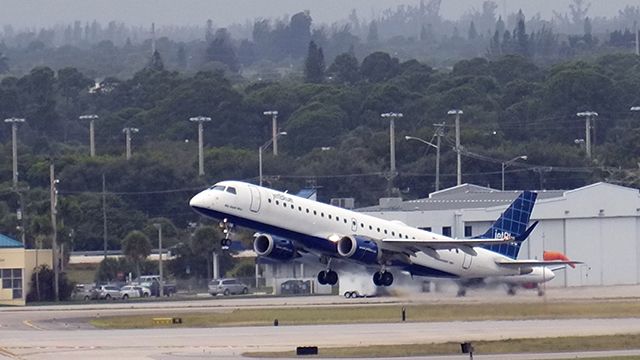
This post originally appeared at The American Prospect.
Next month, JetBlue is adding a first-class section to its hitherto classless — but relatively classy — planes. By virtue of not having a first-class section, JetBlue has been able to provide something that most airlines have long since abolished: legroom for its passengers.
But the egalitarian seating plan has long since disappeared from nearly every airline and JetBlue is a decided latecomer to the prevailing model of airline seating, which we will term the Piketty-Saez Seating Plan, or PSSP.
To be sure, airlines are in no way responsible for the polarization of income and wealth that defines our time. Increasingly, however, their seating plans reflect that polarization, with more and more space and amenities showered on their first-class passengers (whose fares rise accordingly), while less and less space and fewer – increasingly, no – amenities are provided to coach passengers.
In Capital in the 21st Century, economist Thomas Piketty provides data that show conclusively that our current level of economic inequality now is comparable to that at the start of the 20th-century — before two world wars, a Great Depression and the reforms of the New Deal and European social democracy produced a more broadly shared prosperity.
A comparison of today’s airliners with the great fin-de-siècle passenger ships would reveal a similar disparity in their treatment of passengers — lavish accommodations for first class and the bulk of the passengers in steerage. As a socio-economic tract, Titanic could be remade today set on an airliner.
Lest you think I exaggerate, consider the changes that are sweeping the airline industry. A first-class ticket on Emirates Air from Los Angeles to Dubai entitles you to a private compartment — complete with a sliding door, a lie-flat seat and mattress, a vanity, a minibar, a flat-screen TV and luxury bathroom with shower — for a tidy $32,840. Korean Air has installed what The New York Times describes as a “spacious lounge” with fully equipped bar in the first-class sections of its planes. Delta will provide flat-beds for their first-class and business passengers on all their New York to LA flights starting this summer. Virgin Atlantic provides private limousine service to and from airports for their first-class passengers. Not to be outdone, Lufthansa has built an entire separate terminal for its first-classers at the Frankfurt airport, from which they are carried by limousine across the tarmac to their planes. Delta and United whisk their first-class passengers to connecting flights in Porsches and Mercedes, respectively.
Even the air within the plane is apportioned by class. In its first-class cabins, Lufthansa has installed humidifiers that increase the humidity to 25 percent, while in coach, it ranges from five to 10 percent.
The upgrading of travel for the rich (both corporate executives and the just-plain rich) derives from the airlines’ understanding of today’s Willie Sutton economics: To make the big bucks, they go where the big money is. The number of first-class and business-class passengers has grown by 4.1 percent over the past year as profits and investment income reach record highs.
Planes, like economies, are finite things. If more of the wealth goes to the top, less flows to the bottom. On airplanes, what travelers have experienced is the upward, or more precisely, forward redistribution of space — of legroom. When first class expands, coach contracts — not the number of coach seats, just the amount of space allotted to them. According to a New York Times story on business travel that ran earlier this month, “the average seat pitch — the industry standard for the space between two seats, currently about 31 inches — has been reduced by about 10 percent over the last decade. Airlines are also using slimmer economy seats that allow them to add more rows and passengers on their planes.”
Like the department stores of old pitched to the great middle class, the airplane with decent levels of comfort and services pitched to the general public is fast disappearing, if not altogether gone. The fastest expanding airline and among the most profitable, is the discount Spirit Air, which, The Los Angeles Times reports, plans to grow by 15 to 20 percent a year for the next eight years. Spirit charges its benumbed passengers a fee for their carry-on bags, $3 for water and $10 for printing out boarding passes and has seats that, by design, don’t recline. Consumer Reports surveys have found it has one of the lowest overall customer satisfaction scores of any company in any industry that the magazine has ever surveyed. And yet Spirit thrives as the 99-cent store of air travel, because it’s an airline that the downsized working class can afford. JetBlue has tried to buck this trend, but the rise of the 1 percent and the decline of the bottom 90 have forced it to add first class and shrink coach.
Even the dream of accumulating enough coach miles to be bumped up into business class is withering before the imperatives of plutocratic economics. Delta recently announced that next year it will switch from frequent-flyer miles to frequent-flyer dollars: Its awards will be based on how much you spend, not how far you fly.
Is there anything we can do to arrest the ongoing downgrade of air travel for the vast majority of passengers? The airlines reflect, rather than cause, the vertiginous rise of economic inequality, of course, but the evolution of air travel provides a story about the changes inflicted on our economy and the indignities heaped upon all but the rich. If dramatized effectively, that would be universally understood.
Perhaps a new round of Occupy protestors might rise one day in coach and demand that the first-class hors d’oeuvres, or flat beds, or showers be made available to all. After all, the boy from steerage and the girl from first class hit it off in Titanic. Why not on a plane?


